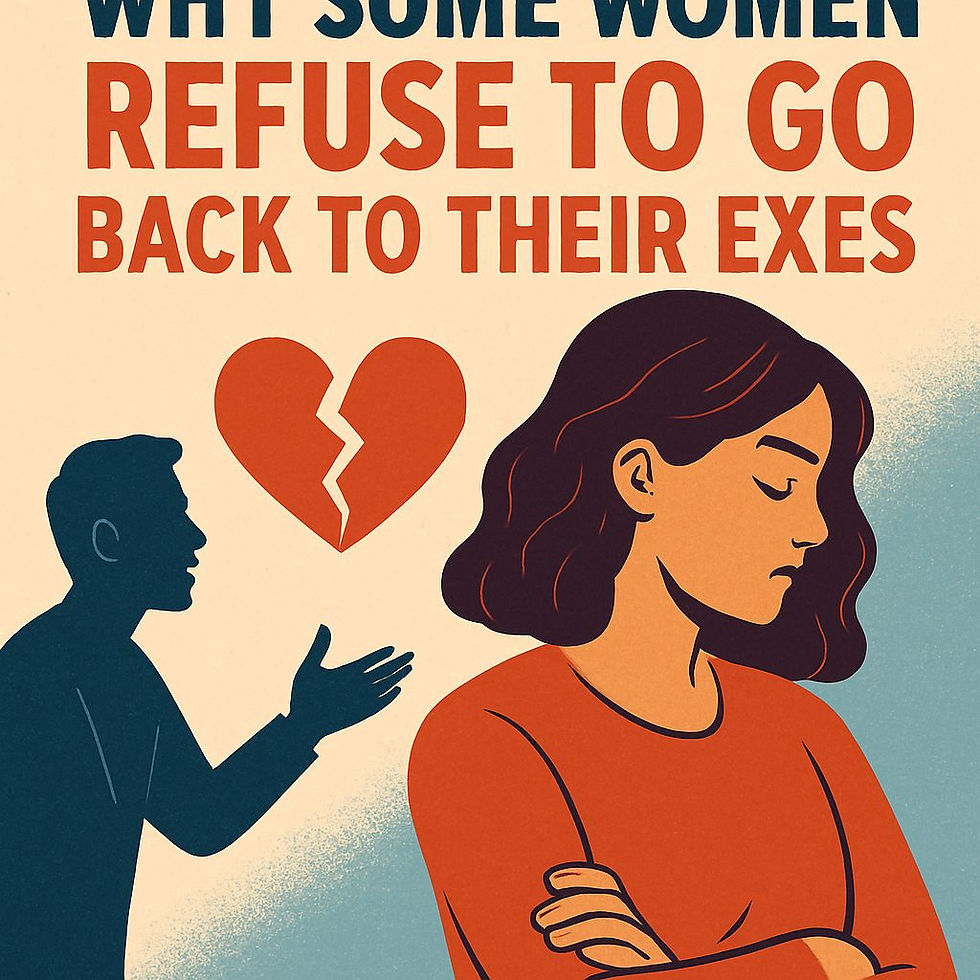Why Some Women Refuse to Go Back to Their Exes
- orpmarketing
- Jun 10, 2025
- 4 min read

Relationships can be a rollercoaster of emotions, and when they end, the decision to move on or reconnect is deeply personal. While some individuals might consider rekindling a past romance, many women firmly choose to close that chapter for good. Here are some key reasons why some women refuse to go back to their exes, shedding light on the emotional, practical, and psychological factors at play.
1. Recognizing Past Patterns
One of the most common reasons women avoid returning to exes is the recognition of unhealthy or unresolvable patterns in the relationship. Whether it was constant arguing, lack of trust, or mismatched priorities, these patterns often signal deeper incompatibilities. After reflecting on the relationship, many women realize that going back would likely mean repeating the same cycles, which they’re unwilling to endure again.
For example, if a relationship was marked by poor communication or emotional neglect, a woman might decide that those issues are unlikely to change, even with promises of improvement. The clarity gained from time apart often reinforces the decision to move forward instead of backward.
2. Prioritizing Personal Growth
Breakups, while painful, can be catalysts for self-discovery and growth. Many women use the post-breakup period to focus on themselves—pursuing new hobbies, advancing their careers, or building stronger friendships. Returning to an ex could feel like a step back from the progress they’ve made.
This newfound independence is empowering, and the idea of re-entering a relationship that didn’t support their growth can feel stifling. Women who have invested in themselves often want a partner who aligns with their evolved sense of self, not someone tied to their past.
3. Trust Issues and Betrayal
Trust is the foundation of any relationship, and once it’s broken, it’s incredibly hard to rebuild. For women who experienced betrayal—whether through infidelity, dishonesty, or emotional manipulation—going back to an ex can seem like an unacceptable risk. The pain of past betrayals often lingers, and the fear of being hurt again can outweigh any lingering feelings of love or nostalgia.
Even in cases where betrayal wasn’t a factor, small breaches of trust, like broken promises or inconsistent behavior, can accumulate. For many women, these experiences are enough to make reconciliation feel unwise.
4. Valuing Self-Respect
Self-respect plays a huge role in the decision to stay away from an ex. If a relationship left a woman feeling undervalued, disrespected, or diminished, she may see returning as a compromise of her worth. Choosing to move on is often a declaration of self-love and a commitment to seeking healthier, more fulfilling relationships.
This is especially true in cases of emotional or physical abuse. Women who have escaped toxic dynamics often prioritize their mental and emotional well-being, refusing to reopen a door that led to harm.
5. Changed Perspectives and Goals
Time apart can shift priorities and perspectives. What once seemed like a perfect match might no longer align with a woman’s current values, goals, or vision for the future. For instance, a woman who once prioritized passion in a relationship might now value stability or shared ambitions. If an ex no longer fits into her evolving life plan, she may choose to let go rather than force compatibility.
This shift can also stem from life changes, like career advancements, relocation, or a desire for different experiences. An ex who was part of a past chapter might not belong in the new one.
6. Emotional Closure
Closure is a powerful motivator for moving on. Many women take time after a breakup to process their emotions, grieve the relationship, and find peace. Once they’ve reached this point, revisiting the past can feel unnecessary or even disruptive. Emotional closure allows them to let go of lingering attachments and focus on new possibilities.
For some, closure comes from understanding why the relationship didn’t work or forgiving their ex (and themselves) for past mistakes. With this clarity, returning to an ex can seem like undoing hard-earned emotional progress.
7. Better Options or New Relationships
Sometimes, the decision to not go back is as simple as finding something—or someone—better. After a breakup, women may meet new partners who offer the respect, love, or compatibility they were missing before. Alternatively, they might find fulfillment in their single life, friendships, or personal pursuits. The prospect of a healthier, happier future can make going back to an ex far less appealing.
Even without a new romantic partner, the realization that better options exist—whether in love, lifestyle, or personal fulfillment—can solidify the choice to leave the past behind.
8. Listening to Intuition
Intuition is a powerful guide, and many women trust their gut when it tells them to stay away. Even if an ex seems to have changed or the circumstances appear promising, a nagging feeling that “it’s not right” can be enough to keep them from reconnecting. This instinct often stems from a deep understanding of their own needs and experiences, even if they can’t fully articulate the reasons.
Conclusion
The decision to not return to an ex is rarely made lightly. It often reflects a combination of self-awareness, emotional strength, and a commitment to a better future. While every woman’s reasons are unique, the common thread is a desire for relationships—and lives—that align with their values, happiness, and growth. By choosing to move forward, these women are not just closing a door but opening themselves up to new possibilities, free from the weight of the past.
Show in sidebar


Comments